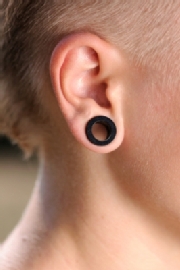
Body piercings have become increasingly popular among young people in the United States, especially in recent years. It is important that health professionals understand the problems that piercings can cause, according to a recent Northwestern Medicine paper, published in the February issue of the American Journal of Clinical Dermatology.
The paper reviews, in detail, the complications and medical consequences of body piercing, focusing on ear, nose, mouth, nipple, navel, and male and female genitalia piercings. The paper also offers suggestions on how to minimize and possibly prevent these complications.
Slideshow: Common piercing complications
While body piercing is fairly safe overall, bacterial infection is the number one complication, affecting about 20 percent of body piercings, according to the review. Other body piercing complications include allergies, loss of blood, scarring, and interference with medical procedures, such as MRI, x-ray, or ultrasound.
“As piercing becomes more popular, the health care community should become familiar with how to remove the jewelry, in the case of an emergency situation, as well as understand piercing complications and related health risks,” said Jaimee Holbrook, MD.
Holbrook is first author of the review article and a second year clinical research fellow in the Department of Dermatology at Northwestern University Feinberg School of Medicine.
The review article was written at the same time as the Feinberg researchers, along with researchers from the Rehabilitation Institute of Chicago, were conducting a trial on an assistive technology that uses magnetic tongue studs to assist people with quadriplegia to use computers and drive their own wheelchairs. The study is funded by the National Institute of Biomedical Imaging and Bioengineering.
There are minimal regulations on who can pierce body parts and no validated guidelines on how it should be done, so besides reviewing the latest medical literature on piercings, the Feinberg team visited local piercing parlors to talk with industry professionals and watch them work.
“Since we are using piercings to attach magnets to the tongues of people with quadriplegia, we need to be aware of what difficulties to expect in order to minimize the risks of serious complications,” said Julia Minocha, MD, second author and a resident in Feinberg’s department of dermatology. “Who knows what other anatomic sites for piercings could be used in the future? If a sensor in the tongue can be used to drive a wheelchair, other devices that we haven’t even thought of yet might also work.”
Nine things to consider before getting a piercing:
- Infection: Do you have a preexisting infection?
- Medical issues: Do you have a history of asthma, hives, or severe allergic reactions?
- Lifestyle: Will you have to remove the piercing for work or contact sports?
- Healing issues: Do you have a predisposition to hypertrophic or keloid scarring?
- Anatomy: Do you have the right anatomy for the piercing you want?
- Professional: Has your piercer been adequately trained?
- Medical history: Does the piercer take a complete medical history, including a history of allergies, systemic diseases, particularly inquiring about cardiac disease, unregulated diabetes mellitus, or other conditions that may predispose to infection?
- Proper materials: Does the piercer use the appropriate, site-specific materials, such as nickel-free jewelry, to minimize the risks of allergy, infection, migration, and rejection?
- Care instructions: Will you receive clear oral and written aftercare instructions? For tongue piercings, it is important to avoid aspirin for seven days and all other nonsteroidal anti-inflammatory drugs (NSAIDS) for at least one day before a piercing procedure and for seven days after the event. Aspirin and NSAIDS are known to increase bleeding.






